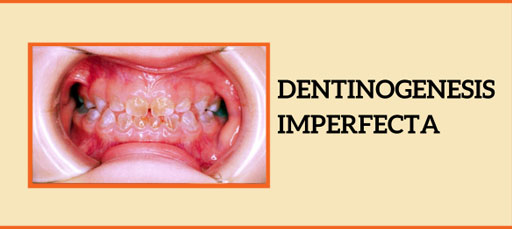
Dentinogenesis Imperfecta – Symptoms, Causes, Treatment
Table of Contents
Dentinogenesis Imperfecta (DI) also known as Dentin abnormality is a rare genetic disorder affecting tooth development. It primarily impacts the formation of dentin, the tissue beneath the enamel responsible for tooth strength. This condition often leads to weakened teeth, making them prone to damage and discoloration. Let’s delve deeper into DI to understand its symptoms, causes, and available treatment options.
Symptoms of Dentinogenesis Imperfecta
- Discolored Teeth: Teeth may appear translucent, amber, gray, or blue-gray due to thin or improper dentin formation.
- Weakness and Fragility: Teeth are more susceptible to breakage, wear, and rapid deterioration.
- Malformation: Teeth may have a bulbous appearance with an abnormal shape and size.
- Increased Sensitivity: Heightened sensitivity to temperature changes or pressure on the teeth.
- Delayed Tooth Eruption: A delayed or irregular eruption of primary and permanent teeth.
Causes of Dentinogenesis Imperfecta
DI is primarily caused by genetic mutations affecting dentin formation. It’s typically inherited in an autosomal dominant pattern, meaning a single copy of the mutated gene from one parent is enough to cause the condition. Sometimes, DI can also arise from spontaneous mutations.
Treatment Options for Dentinogenesis Imperfecta
- Preventive Care: Regular dental visits are crucial for early detection and management of DI. Dental professionals can monitor the condition and provide guidance on oral hygiene.
- Bonding and Crowns: Dental bonding or crowns can improve the appearance and strength of affected teeth, protecting them from further damage.
- Orthodontic Treatment: Orthodontic interventions might be necessary to manage alignment issues caused by malformed teeth.
- Dental Implants: In severe cases where teeth are severely damaged or lost, dental implants can be considered as a replacement option.
Coping Strategies and Lifestyle Tips
- Oral Hygiene: Maintaining good oral hygiene is essential. Use fluoride toothpaste and follow a dentist-recommended oral care routine.
- Dietary Considerations: Avoid foods that may contribute to tooth decay and damage, such as sugary or acidic foods.
- Regular Check-ups: Schedule frequent dental check-ups to monitor and address any emerging issues promptly.
Conclusion
While Dentinogenesis Imperfecta poses challenges for affected individuals, early detection, proper dental care, and advancements in dental treatments can significantly improve the quality of life for those living with this condition. Dentists and specialists play a crucial role in managing DI, providing tailored treatments to protect teeth and maintain oral health.
If you suspect you or a loved one might have symptoms of DI, seeking professional dental advice is crucial for proper diagnosis and management. Visit the nearest Clove Dental Clinic for Dentinogenesis Imperfecta Treatment.
Leave a Reply
Leave a Reply
Explore More Similar Posts
Explore More Blogs


Leave a Reply